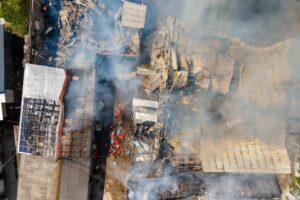Hurricanes pose significant risks to property owners in vulnerable areas. Proper insurance coverage is essential to protect your investment and ensure a smooth recovery process. Here’s what you need to know to secure the right hurricane insurance coverage:
Why Adequate Hurricane Coverage Is Important
Hurricane coverage encompasses various protections against windstorm damage, flood damage, and additional living expenses (ALE) during recovery. This insurance is crucial for safeguarding both your property and financial stability.
Key Elements of Comprehensive Hurricane Coverage
Windstorm and Hurricane Coverage
When considering your insurance policy, start with windstorm and hurricane Coverage. This coverage is your essential defense against the destructive impacts of hurricanes. Make sure your policy includes protection against wind-related damage, such as roof damage and shattered windows. This coverage not only shields your property but also provides you with peace of mind.
Flood Insurance
In hurricane-prone zones, flooding is a major concern. While Windstorm and Hurricane Coverage are crucial, they may not cover flooding resulting from storm surges or heavy rainfall. To address this gap, think about adding a separate Flood Insurance Policy. This comprehensive coverage takes care of both structural damage and your belongings in the event of flooding.
Additional Living Expenses (ALE) Coverage
After a hurricane, your home might be uninhabitable due to extensive damage. This is where Additional Living Expenses (ALE) Coverage comes into play. ALE ensures you have support for temporary housing, meals, and other necessities while your property is being restored. This provision in your policy can greatly ease the challenge you face during the post-hurricane period.
Named Storm Deductibles
Understanding your policy’s deductibles, including Named Storm Deductibles, is crucial. These deductibles apply specifically to damage caused by named hurricanes or tropical storms. Keep in mind that these deductibles are often higher than your standard deductible. Knowing these details can help you avoid unexpected financial setbacks.
Timing is Key: Act Before the Storm
Keep in mind— once a hurricane is named, you cannot modify your insurance policy. Taking a proactive approach and reviewing/ updating your coverage before a hurricane approaches is in your best interest.
We have partnered with the Merlin Law Group to provide extra insight into the importance of hurricane coverage. Merlin Law Group has created guides specifically to assist policyholders in preparing for hurricane season. For residential policyholders, they have a Hurricane Checklist with tips on how to protect their property. As well as a Condominium Hurricane Preparedness Guide for multi-family properties.
As industry leaders, we’re committed to supporting you not just as policyholders but as individuals seeking security and recovery after a devastating loss like a hurricane. Premier Claims is here to guide you every step of the way. For a complimentary policy review, fill out our policy review form: https://premier-claims.com/policy-review/


